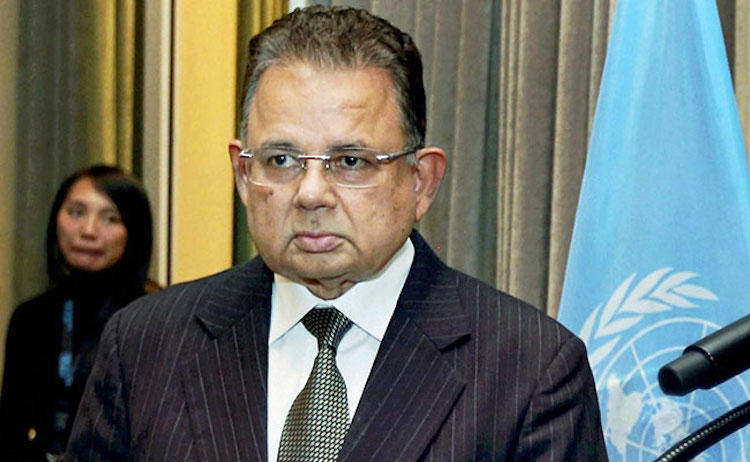By J Nastranis
NEW YORK (IDN) – India has scored a “historic” victory over Britain, one of the five permanent members (P5) of the Security Council, with the re-election of Justice Dalveer Bhandari to the International Court of Justice (ICJ), principal judicial organ of the United Nations. The win is historic because it’s the first time since 1946 that no judge from a P5 member is a part of the ICJ, which has its seat in The Hague, the Netherlands.
After Britain pulled out its candidate Christopher Greenwood before the 12th round of voting on November 20, Justice Bhandari won the last of five seats for which elections were held. He received 183 votes in the 193-member General Assembly and secured all the 15 votes in the Security Council after separate and simultaneous elections were held at the UN headquarters in New York.
For 11 rounds, the two were locked in a stalemate – with Justice Bhandari getting majority support in the General Assembly and Justice Greenwood in the Security Council, both of which vote in elections to the world court.
The ICJ has a total of 15 judges, five of whom are elected triennially for a nine-year term. To be elected, the candidate must receive an absolute majority in both the General Assembly and the Security Council.
Speaking to the press, India’s Permanent Representative to the UN, Ambassador Syed Akbaruddin said that the re-election reflected the fact that India was now “globally acknowledged as a country which can contribute” in many fields including international law.
He noted that the result was due to efforts of not just Indian officials in the UN but also of political leaders like External Affairs Minister Sushma Swaraj, foreign policy establishments in Delhi and Indian missions worldwide, who were engaged fully in the process.
According to Akbaruddin, the victory of Justice Bhandari was important because changes in global world order must be recognized and reflected with fair representation at the United Nations. Noting that it was “a reflection of the real picture of the world”, he stated that the result also showcased the effort put in by everybody.
He highlighted that India’s successes on the global platform were “a reflection of rising India, a new India” and an acknowledgement that the country needed to be given “its rightful place in the world order.” The election also revealed the importance attached by nations to the true representation and democratic process.
Prime Minister Narendra Modi said Justice Bhandari’s re-election was “a proud moment for us.”
Justice Bhandari’s re-election came within months of the Indian nominee for International Tribunal for the Law of the Sea (ITLOS), Neeru Chadha, topping in the ballot for the Asia-Pacific group in a keenly fought election for a seat on the tribunal which adjudicates cases related to the law of the seas. The seat of ITLOS is in Hamburg, Germany.
Chadha, with 120 votes, is the first Indian woman to serve on the prestigious panel. The election took place at the UN headquarters in New York on June 14, 2017.
Chadha is the Ministry of External Affairs’ first woman chief legal officer. She will replace P. Chandrashekhara Rao, who steps down this year after 21 years as a judge at the tribunal. Chadha was in a fight for one of two vacant seats for Asian countries, which were up for grabs in this election.
Analysing the outcome of the fiercely-fought re-election of Juatice Bhandari, Rajeesh Kumar, Associate Fellow at Institute for Defence Studies and Analyses (IDSA), writes: “Though it is remarkable that India fought and won a seat that is allotted for ‘Western Europe and Other’ category, policymakers need to ponder over the failure to secure the seat reserved for Asia.” India contested in the ‘Europe and Other’ category because the Asian position was filled by the Lebanese candidate during the very first round of the election.
The IDSA expert asks: “How did a smaller state like Lebanon manage to mobilize an absolute majority in the Security Council when an emerging power like India could not? This was partly because of India’s very late announcement of Bhandari’s candidacy, only four months back. In contrast, Lebanon had been campaigning for the last two years and managed to get the backing of both houses.”
This points to the possibility, he adds, that some of the members of the Security Council including the P-5 had endorsed their support to the Lebanese candidate even before India announced its candidate. “This could have happened in the case of the Security Council’s support for Justice Greenwood as well. A longer term strategy and preparation would help to minimize similar occurrences in future.” [IDN-InDepthNews – 11 December 2017]
Photo: UN General Assembly and the Security Council re-elected Justice Dalveer Bhandari to the World Court on November 20, 2017.
IDN is the flagship agency of International Press Syndicate.
Facebook.com/IDN.GoingDeeper – twitter.com/InDepthNews

